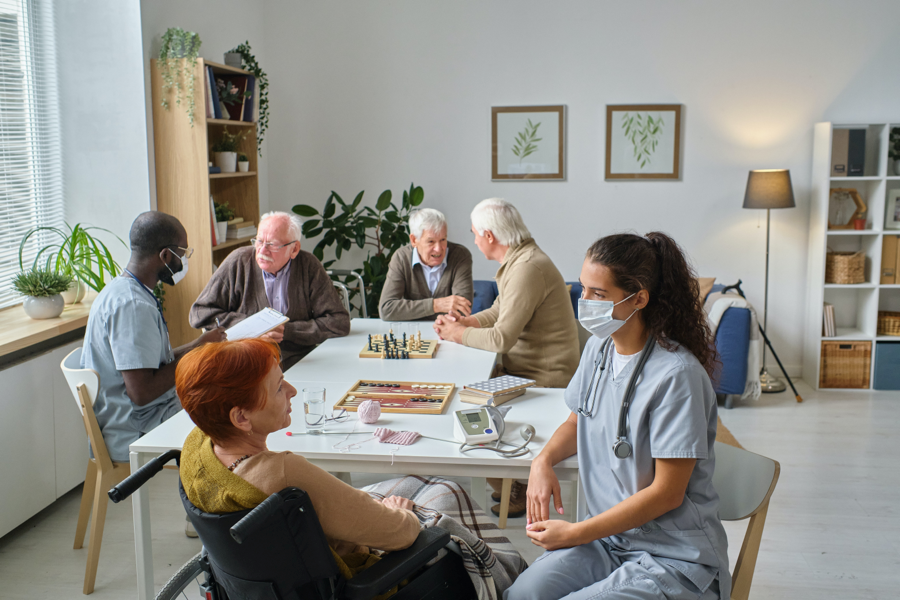
CLINICAL PRACTICE
Promoting Independence and Quality of Life for Seniors: Strategies for CNAs
-
 EveryNurse Staff
EveryNurse Staff
- Last Updated: 05/18/2023

As a Certified Nursing Assistant (CNA), you play a critical role in supporting senior clients. One of the most important aspects of your job is promoting independence and quality of life for seniors. The strategies you use to do so can make a huge difference in the lives of your clients. In this article, we will explore how you can support senior independence and quality of life as a CNA.
The Importance of Independence and Quality of Life for Seniors
Independence and quality of life are essential components of aging well. As we age, our physical and mental capabilities may decline, but this does not mean that seniors cannot live fulfilling and meaningful lives. An environment that supports independence and quality of life can help seniors maintain their dignity, autonomy, and sense of self-worth. It can also help promote physical and mental health and reduce the risk of depression and isolation.
The Connection Between Independence and Quality of Life
The Role of CNAs in Supporting Senior Independence
As a CNA, you have a unique opportunity to support senior independence. You are often the primary caregiver for seniors, and you can help them perform daily activities and make choices that allow them to maintain their independence. This includes tasks such as assisting with personal hygiene, grooming, and meal preparation. By doing so, you can help seniors maintain their dignity and autonomy while also ensuring their health and safety.
Building Trust and Communication with Senior Clients
Building trust and communication with senior clients is an essential aspect of providing quality care. It is important to understand that seniors may feel vulnerable, anxious, or overwhelmed, especially if they are dealing with health issues. Therefore, establishing a rapport with your clients is crucial in helping them feel more comfortable and confident.
One way to establish a connection with your senior clients is by taking the time to get to know them. Ask them about their interests, hobbies, and experiences, and listen attentively to their responses. This will not only show your clients that you care about them, but it will also help you understand their needs and preferences.
Active Listening and Empathy
Active listening and empathy are critical skills for building trust and communication with senior clients. When you actively listen to your clients, you show them that you are interested in their needs, concerns, and experiences. It is important to give your clients your undivided attention and avoid distractions such as cell phones or other electronic devices.
Demonstrating empathy is also an essential aspect of building trust and communication. By showing your clients that you care about their feelings and are willing to support them in any way possible, you can help them feel more comfortable and secure.
Establishing a Comfortable Environment
Creating a comfortable environment can also help build trust and communication with senior clients. Seniors may feel more at ease in familiar surroundings, so it is important to incorporate familiar items, such as family photos or favorite blankets, into their living spaces. Additionally, ensuring that their living spaces are clean, well-lit, and free of hazards can help seniors feel safe and secure.
Another way to establish a comfortable environment is by creating a warm and welcoming atmosphere. This can be achieved by using soft lighting, playing calming music, or incorporating plants or other natural elements into the living space. Additionally, providing comfortable seating and ensuring that the temperature is set to the client’s preference can also contribute to a comfortable environment.
Effective Communication
Effective communication is essential for building trust and promoting independence with senior clients. It is important to communicate clearly and respectfully, using language that is easy to understand. Additionally, it is important to listen to your client’s concerns and respond in a timely and appropriate manner.
Another aspect of effective communication is being aware of nonverbal cues. Seniors may have difficulty expressing themselves verbally, so it is important to pay attention to their body language and facial expressions. This can help you understand their needs and preferences, even if they are not able to express them verbally.
Encouraging Physical Activity and Mobility
Physical activity and mobility are critical components of independence and quality of life for seniors. By encouraging seniors to remain active and mobile, you can help them maintain their physical health, reduce the risk of falls, and promote mental well-being.
As a CNA, you play an important role in encouraging physical activity and mobility for seniors. You can start by talking to your clients about the benefits of staying active and helping them set goals for themselves. For example, you can encourage them to take a short walk every day or to do some simple stretches while watching TV.
Safe and Appropriate Exercises for Seniors
Safe and appropriate exercises can help seniors maintain their physical health and mobility. As a CNA, you can encourage seniors to engage in activities such as walking, stretching, and chair yoga. It is important to ensure that exercises are safe and appropriate for each individual, and to consult with a healthcare provider as needed.
When working with seniors on exercise routines, it is important to take into account any physical limitations or health issues they may have. For example, if a client has arthritis, you may need to modify their exercise routine to avoid putting too much strain on their joints. You can also work with physical therapists or other healthcare professionals to develop exercise plans that are tailored to each client’s specific needs.
Assisting with Mobility Aids and Equipment
Assisting with mobility aids and equipment can also help seniors maintain their independence. This includes tasks such as helping clients use walkers or canes, adjusting bed rails, and assisting with transfers. By ensuring that seniors have access to the tools they need to remain mobile, you can help them maintain their independence and quality of life.
When working with clients who use mobility aids, it is important to ensure that the aids are properly adjusted and maintained. For example, you may need to adjust the height of a walker or cane to ensure that it is the right size for your client. You can also help clients practice using their aids safely and effectively, such as by demonstrating how to use a walker on stairs or uneven surfaces.
Supporting Mental and Emotional Well-Being
Engaging in Meaningful Activities and Conversations
Engaging in meaningful activities and conversations can help seniors maintain their mental health and sense of purpose. This includes tasks such as playing games, doing puzzles, or engaging in hobbies. Additionally, simply spending time with seniors and engaging in conversations about their interests or experiences can help them feel valued and connected.
For example, if your client loves gardening but is no longer able to do it on their own, you can help them by creating a small indoor garden or bringing in some potted plants. This can provide a sense of accomplishment and purpose, and also serve as a conversation starter to discuss their love for gardening.
Another way to engage in meaningful activities is to encourage your client to reminisce about their past. This can be done by looking through old photo albums or listening to their favorite music. This not only helps them feel connected to their past, but also helps them feel valued and heard.
Recognizing and Addressing Signs of Depression or Anxiety
Depression and anxiety are common among seniors, and can have a significant impact on their quality of life. As a CNA, it is important to monitor for signs of these conditions, such as changes in mood or behavior, lack of interest in activities, or social withdrawal. If you identify these signs, it is important to alert the appropriate healthcare providers and provide emotional support as needed.
It is also important to note that depression and anxiety can be caused by a variety of factors, including physical health issues, medication side effects, or life changes such as the loss of a loved one. As a CNA, it is important to work with the healthcare team to identify and address the underlying cause of these conditions.
Additionally, you can provide emotional support by listening to your client and validating their feelings. This can be as simple as saying, “I hear you” or “That sounds really tough.” You can also encourage them to participate in activities that they enjoy and offer to accompany them if they are feeling anxious or overwhelmed.
Fostering Social Connections and Community Involvement
Encouraging Participation in Group Activities
Encouraging seniors to participate in group activities can help them build social connections and feel more connected to their community. This includes activities such as group exercise classes, book clubs, or volunteer opportunities.
Facilitating Family Visits and Communication
Conclusion
Promoting independence and quality of life for seniors is a critical aspect of being a CNA. By understanding the importance of independence and quality of life, building trust and communication with your clients, encouraging physical activity and mobility, supporting mental and emotional well-being, and fostering social connections and community involvement, you can help your clients Age Well and live fulfilling lives.























